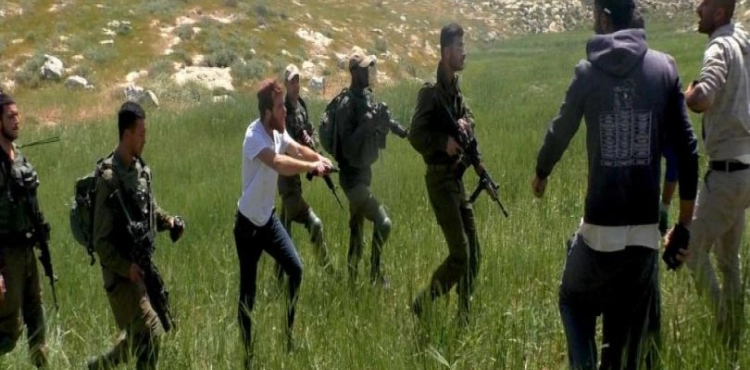Issa Qattash, 40, still remembers what happened to him last April 16, when he and his brother were wounded, after they were severely beaten by a group of Israeli settlers, while they were on a picnic with their families in a forested area outside a village Pocket, north of Ramallah (central occupied West Bank).
"One of the settlers was carrying a gun and another was an ax. My brother Moses managed to escape to seek help ... I lay on the ground while I was injured for a while, and then the settlers began to drag me out of the area ... but then the Israeli soldiers arrived and released me," said Issa. And they let the settlers go their way. " His mother Fatima Qattash, who witnessed the incident, who is 70 years old, added: "We were all shocked and we were afraid ... and children still have nightmares." In a report, the United Nations Office for the Coordination of Humanitarian Affairs "OCHA" documented 143 attacks attributed to Israeli settlers during the first five months of the year 2020, causing 38 injuries to Palestinians, or damage to their property, to 105 incidents. These accidents resulted in the injury of 63 Palestinians, including 13 children, injured and damaged more than 3,000 and 700 trees and seedlings, various field crops, and more than 100 vehicles. Hotbeds of settler violence According to the "OCHA" report, the outpost that was established about two years ago was formed as a cattle farm east of the settlement "Halmish" near Ramallah, one of the hot spots during the first five months of the year 2020. The residents of three nearby Palestinian villages (Jibya, Copper, and Umm Safa) reported that this settlement is a source of intimidation and systematic violence, which has increased over the past year. In terms of damage to agricultural property, the most significant incidents were recorded in the Gush Etzion settlement area, west of Bethlehem (south) and near the Adi ´Ad settlement outpost, northeast of Ramallah, where more than 60 percent of the total of 3,000 and 700 trees are located. Settlers destroyed it between January and May in these two regions. The settlement area in the city of Hebron, where around 7,000 Palestinians have been affected by the long-standing restrictions on access (which have nothing to do with the epidemic), constituted an additional hot spot, with 18 attacks recorded between January May 2020. These incidents represented a continuation of the increasing frequency of settler violence, which has been recorded since the beginning of 2019 after the departure of the Temporary International Presence Mission in the city of Hebron (south). Other hotspots included the "Yitzhar" settlement and the surrounding settlement outposts in Nablus (north), where 22 incidents were recorded that damaged the residents of five villages, and the settlement of Homesh (also in Nablus), which was evacuated in 2005 and the settlers resumed in recent years, where It was the source of seven attacks that affected the residents of Burin village; The center of Hafat Ma´on settlement, south of Hebron, where six attacks were launched and damaged the residents of Al-Tuwani village. The report of the UN office confirmed that the settlements established in the Occupied Palestinian Territory in contravention of international law are a major source of the vulnerability of Palestinians, depriving them of their property and livelihoods, leading to restrictions on access and producing a range of threats to their protection, including It includes violent attacks, such as this article. Impunity policy He added that this phenomenon is exacerbated by the long-standing loopholes in law enforcement by the Israeli authorities on violent settlers, as it has created a "prevailing climate of impunity", as reported by the United Nations Secretary-General. According to a report published by Yesh Din, an Israeli human rights organization, among 273 investigation files opened by the police against settlers who assaulted Palestinians and monitored by the organization between 2014 and 2019 and reached its final stages, only 25, or 9 percent, resulted Among them was the pursuit of settler violence, while the other 248 files were closed without anyone being indicted. For his part, B´Tselem, the Israeli Information Center for Human Rights said: The settler violence is not "exceptions", but rather is part of a strategic activity that the state allows, participates in, and benefits from its consequences. He added that the long-term result of these actions is the theft of more and more land from the hands of the Palestinians throughout the West Bank, which makes it easier for the state to control the West Bank and its resources. As of early 2019, the number of settlers in the occupied West Bank, including the city of Jerusalem, reached 670,000, of whom 228,000 and 500 were in the city of Jerusalem. In mid-2019, the Palestinian Central Bureau of Statistics estimated the number of Palestinians in the West Bank at about 3 million. By an overwhelming majority, the international community considers the settlements illegal, and this is partly based on the Fourth Geneva Convention, which prevents the occupying power from transferring Israelis to the occupied territories.












